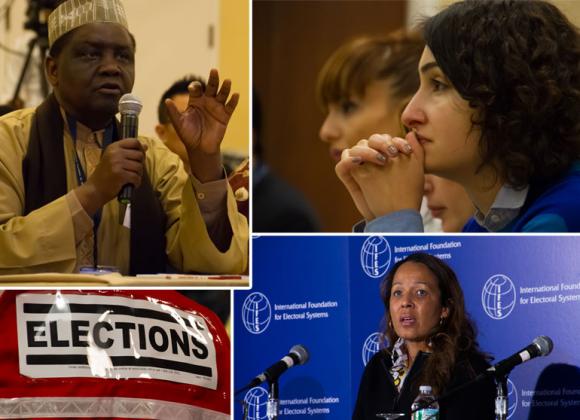
Highlights of the 2014 USEP
From November 2-5, 2014, the International Foundation for Electoral Systems (IFES) gathered nearly 150 participants from 55 countries for the 2014 U.S. Election Program (USEP). This year’s USEP was the 12th hosted by IFES since 1992. This flagship event brings together election officials, parliamentarians and diplomats from around the world to observe and learn about the U.S. electoral system as well as discuss elections and voting from comparative international perspectives.
To provide a baseline level of understanding for all participants, the program began with a primer on the U.S. election system that provided participants with a detailed explanation of the decentralized, complex nature of elections and voting in America. Across the four-day program, participants were also offered sessions that featured a variety of experts – including IFES staff, academics, current and former U.S. government officials and human rights activists – on salient topics such as voter identification; public opinion; social media; campaign finance; accessibility for persons with disabilities; and strategies for boosting women’s participation in politics. Each of the sessions provided ample time for discussion among the participants and panelists, allowing for a fruitful exchange of ideas that reflected participant’s experiences with these issues in their own countries.

Participants also took part in an interactive election access simulation that reflected the experiences of voters with disabilities. In one mock polling station, participants were able to experience a fully accessible station with mock poll workers who provided assistance that comports with international best practices. Participants were also able to attempt to vote in a mock polling station that was not accessible, highlighting the challenges voters with disabilities face in many places around the world. One of the most important aspects of the USEP is the opportunity for participants to build relationships with colleagues from around the world and exchange best practices and lessons learned. In order to facilitate such dialogue, the USEP featured evening receptions providing participants the opportunity to mingle, build on existing partnerships and cultivate new relationships.
 At a special reception on Monday evening, IFES honored Dr. Christiana Thorpe, the Chief Electoral Commissioner and Chairwoman of the National Election Commission of Sierra Leone, with the 2014 Joe C. Baxter Award. While Dr. Thorpe was unable to leave her country, valiantly staying in Sierra Leone to assist in efforts to combat the spread of Ebola, the reception featured a moving video message in which she discussed the importance of women’s rights and education in electoral processes.
At a special reception on Monday evening, IFES honored Dr. Christiana Thorpe, the Chief Electoral Commissioner and Chairwoman of the National Election Commission of Sierra Leone, with the 2014 Joe C. Baxter Award. While Dr. Thorpe was unable to leave her country, valiantly staying in Sierra Leone to assist in efforts to combat the spread of Ebola, the reception featured a moving video message in which she discussed the importance of women’s rights and education in electoral processes.
Another highlight of the program was the polling tour, which took participants to polling stations throughout the District of Columbia, Maryland and Virginia to witness the American voting process. At these polling stations, participants were able to ask questions of voting precinct personnel and view what IFES President and CEO Bill Sweeney called “our celebration of democracy,” as Americans voted in the 2014 midterm elections. At the conclusion of the day, everyone gathered together for an evening reception to watch as the election results came in.

The 2014 U.S. Election Program ended on Wednesday at the U.S. Institute of Peace with a facilitated discussion among all the participants, who reflected and reacted to their experiences over the course of the program. In his closing remarks ending the USEP, President Sweeney thanked all of the participants for their invaluable contributions during the morning discussion and noted how successfully the program fostered relationships and expanded the expertise of IFES and all the participants alike.








